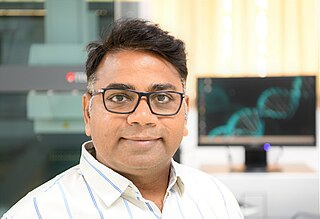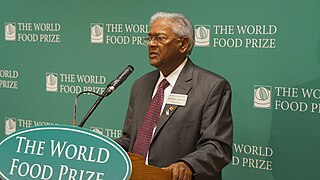Related Research Articles

Wheat is a grass widely cultivated for its seed, a cereal grain that is a worldwide staple food. The many species of wheat together make up the genus Triticum ; the most widely grown is common wheat. The archaeological record suggests that wheat was first cultivated in the regions of the Fertile Crescent around 9600 BCE. Botanically, the wheat kernel is a type of fruit called a caryopsis.

Triticale is a hybrid of wheat (Triticum) and rye (Secale) first bred in laboratories during the late 19th century in Scotland and Germany. Commercially available triticale is almost always a second-generation hybrid, i.e., a cross between two kinds of primary (first-cross) triticales. As a rule, triticale combines the yield potential and grain quality of wheat with the disease and environmental tolerance of rye. Only recently has it been developed into a commercially viable crop. Depending on the cultivar, triticale can more or less resemble either of its parents. It is grown mostly for forage or fodder, although some triticale-based foods can be purchased at health food stores and can be found in some breakfast cereals.

Marco A. Marra is a Distinguished Scientist and Director of Canada's Michael Smith Genome Sciences Centre at the BC Cancer Research Centre and Professor of Medical Genetics at the University of British Columbia (UBC). He also serves as UBC Canada Research Chair in Genome Science for the Canadian Institutes of Health Research and is an inductee in the Canadian Medical Hall of Fame. Marra has been instrumental in bringing genome science to Canada by demonstrating the pivotal role that genomics can play in human health and disease research.
Agriculture and Agri-Food Canada is the department of the Government of Canada responsible for the federal regulation of agriculture, including policies governing the production, processing, and marketing of all farm, food, and agri-based products. Agriculture in Canada is a shared jurisdiction and the department works with the provinces and territories in the development and delivery of policies and programs.
Genotyping is the process of determining differences in the genetic make-up (genotype) of an individual by examining the individual's DNA sequence using biological assays and comparing it to another individual's sequence or a reference sequence. It reveals the alleles an individual has inherited from their parents. Traditionally genotyping is the use of DNA sequences to define biological populations by use of molecular tools. It does not usually involve defining the genes of an individual.

Fiona Brinkman is a Professor in Bioinformatics and Genomics in the Department of Molecular Biology and Biochemistry at Simon Fraser University in British Columbia, Canada, and is a leader in the area of microbial bioinformatics. She is interested in developing "more sustainable, holistic approaches for infectious disease control and conservation of microbiomes".

Agropyron cristatum, the crested wheat grass, crested wheatgrass, fairway crested wheat grass, is a species in the family Poaceae. This plant is often used as forage and erosion control. It is well known as a widespread introduced species on the prairies of the United States and Canada.

Nagendra Kumar Singh is an Indian agricultural scientist. He is presently a National Professor Dr. B.P. Pal Chair and JC Bose National Fellow at ICAR-National Institute for Plant Biotechnology, Indian Agricultural Research Institute, New Delhi. He was born in a small village Rajapur in the Mau District of Uttar Pradesh, India. He is known for his research in the area of plant genomics, genetics, molecular breeding and biotechnology, particularly for his contribution in the decoding of rice, tomato, wheat, pigeon pea, jute and mango genomes and understanding of wheat seed storage proteins and their effect on wheat quality. He has made significant advances in comparative analysis of rice and wheat genomes and mapping of genes for yield, salt tolerance and basmati quality traits in rice. He is one of the highest cited agricultural scientists from India for the last five years.

Rajeev Kumar Varshney is an Indian agricultural scientist, specializing in genomics, genetics, molecular breeding and capacity building in developing countries. Varshney is currently serving as Director, Western Australian State Agricultural Biotechnology Center; Director, Centre for Crop & Food Innovation; and International Chair in Agriculture & Food Security with the Food Futures Institute at Murdoch University, Australia since Feb 2022. Before joining Murdoch University, Australia he served International Crops Research Institute for the Semi-Arid Tropics (ICRISAT), a global agriculture R&D institute, for more than 16 years in different scientific and research leadership roles including Research Program Director for three global research programs– Grain Legumes, Genetic Gains and Accelerated Crop Improvement Program. He has the onus of establishing and nurturing the Center of Excellence in Genomics & Systems Biology (CEGSB), a globally recognized center for genomics research at ICRISAT that made impacts on improving agriculture and development of human resources in several countries including India, China, Kenya, Ethiopia, Tanzania, Nigeria, Ghana, Mali, Senegal, Burkina Faso, etc. Varshney holds Adjunct/Honorary/Visiting Professor positions at 10 academic institutions in Australia, China, Ghana, Hong Kong and India, including The University of Western Australia, University of Queensland, West Africa Centre for Crop Improvement, University of Hyderabad, Chaudhary Charan Singh University and Professor Jayashankar Telangana State Agricultural University.

Dr. Sanjaya Rajaram was an Indian-born Mexican scientist and winner of the 2014 World Food Prize. He was awarded this prize for his scientific research in developing 480 wheat varieties that have been released in 51 countries. This innovation has led to an increase in world wheat production – by more than 200 million tons – building upon the successes of the Green Revolution. The Government of India awarded him highest civilian awards Padma Shri (2001) and Padma Bhushan (2022).
The Cereal Research Centre was a research institute established in 1925 based at the University of Manitoba in Winnipeg. It became part of a national network of research centres operated by Agriculture and Agri-Food Canada. Its research led to the development of over two hundred varieties of plant species resistant to pests and blights and producing high yields suitable for cultivation in the Canadian Prairies.
Paramjit Khurana is an Indian scientist in Plant Biotechnology, Molecular Biology, Genomics who is presently Professor in the Department of Plant Molecular Biology in the University of Delhi, Delhi. She has received many awards and published more than 125 scientific papers.
Catherine Feuillet is a French geneticist who is currently the Chief Scientific Officer of Inari Agriculture, a Cambridge MA based biotechnology company. Feuillet earned a PhD in plant molecular biology on the isolation and characterization of genes involved in wood formation in eucalyptus trees. She started to work on the genetics of disease resistance in wheat in 1994 during her post-doctoral studies at the Swiss Federal Institute for Agroecology. She then moved as a junior group leader to the University of Zurich where she investigated the molecular basis of fungal disease resistance in wheat and in barley and cloned the first leaf rust resistance gene from wheat. In 2004 she was hired as a research director at the Institut National de la Recherche Agronomique (INRA) in France to lead European and international projects on wheat genomics.
Elizabeth Pattey is a principal research scientist at Agriculture and Agri-Food Canada (AAFC) and the leader of the micrometeorology laboratory at the Ottawa Research and Development Centre. Her research supports nationwide improvement in the environmental performance of agriculture, in support of the United Nations' Framework Convention on Climate Change and Canada’s Clean Air Act. She is the co-author for over 80 peer-reviewed scientific publications, and her areas of expertise include trace gas flux measurement techniques, process-based models, and remote-sensing applications.
Tilak Raj Sharma is an Indian plant biologist, the Deputy Director General (CS) of ICAR and former executive director and chief executive officer of the National Agri-Food Biotechnology Institute (NABI), and Center of Innovative and Applied Bioprocessing (CIAB) respectively, both autonomous institutes under the Department of Biotechnology. Known for his studies in the fields of genomics and plant disease resistance, Sharma is an elected fellow of the National Academy of Sciences, India, the National Academy of Agricultural Sciences and the Indian National Science Academy. The Department of Biotechnology of the Government of India awarded him the National Bioscience Award for Career Development, one of the highest Indian science awards, for his contributions to biosciences in 2007.
For the American folk singer and songwriter, see Nancy Ames.
Isobel Parkin is a Canadian research scientist with Agriculture and Agri-Food Canada. She is one of the world's premier canola scientists and her area of expertise focuses on brassica genomics, comparative genome organization, global gene expression analysis, and abiotic stress responses. She is well known for her work on an international project on the genetics of oil seeds, in particular the mapping and sequencing of the canola oil genome. She Co-lead the Canadian Canola Genome Sequence (CanSeq) team that successfully deciphered the canola genome and developed a high-quality genome sequence.
Ernest Robert Sears was an American geneticist, botanist, pioneer of plant genetics, and leading expert on wheat cytogenetics. Sears and Sir Ralph Riley (1924–1999) are perhaps the two most important founders of chromosome engineering in plant breeding.
Jennifer Mitchell Fetch is a Canadian research scientist with Agriculture and Agri-Food Canada (AAFC) with expertise in oat breeding. She is known for running the only organic oat breeding program in Canada and helping with the development of several oat milling quality cultivars, including the first organically developed cultivar, AAC Oravena. Canada is the largest exporter of oats in the world, emphasizing the importance of developing new and improved cultivars for farmers. Canada is responsible for producing approximately 3 million tonnes of quality oats every year, with 90% being from Western Canada, where Mitchell Fetch focused her research and was the only Agriculture Canada oat breeder for years. Mitchell Fetch was employed by AAFC in 1998 and spent 22 years as an oat breeder before her retirement in 2020.
Diane G. O. Saunders is a British biologist and group leader at the John Innes Centre and an Honorary Professor in the School of Biological Sciences at the University of East Anglia. Her research investigates plant pathogens that pose a threat to agriculture. She was awarded the Rosalind Franklin Award by the Royal Society in 2022.
References
- 1 2 3 "Cloutier, Sylvie, Ph.D." Ottawa Research and Development Centre: Scientific Staff and Expertise. Agriculture and Agri-Food Canada. Retrieved 8 October 2020.
- 1 2 "Cloutier, Sylvie". Department of Biology: People. University of Ottawa. Retrieved 3 September 2020.
- 1 2 "Sylvie Cloutier". Linkedin. Retrieved 3 March 2017.
- 1 2 "4D Wheat". Genome Prairie. Retrieved February 11, 2021.
- 1 2 3 Telford, Rachel. "Increasing Wheat Research". Ontario Grain Farmer. Retrieved 3 March 2017.[ permanent dead link ]
- ↑ "4DWheat: Diversity, Discovery, Design and Delivery". Genome Canada.
- ↑ "FCC honours five women leaders in agriculture". Manitoba Co-operator. April 9, 2013.